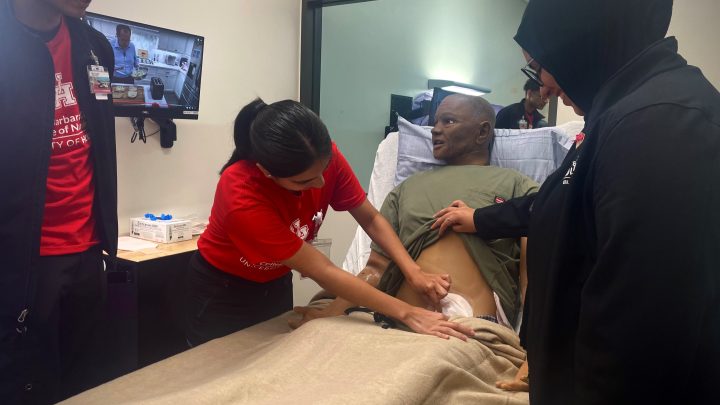
Despite nurse shortage, tens of thousands are turned away from training programs
Despite nurse shortage, tens of thousands are turned away from training programs

In a brightly lit room staged to look like a patient’s living room, nursing student Mawaddah Mohamed took the blood pressure of “Freddie,” a robotic manikin who can talk, breathe, blink, sweat and has a pulse.
At the University of Houston’s Andy and Barbara Gessner College of Nursing, students like Mohamed test their nursing skills in high-tech simulations before shadowing working nurses in real-life health care settings.
“Whenever I talk to patients, I talk to them with confidence that I feel like I can actually help them,” said Mohamed, who even with a year of school left, has had hands-on training that’s prepared her to enter the demanding field of nursing.
But qualified nurses are highly sought. Mohamed is practically guaranteed a job when she completes her studies — the college advertises a 100% employment rate for its graduates.
Programs like this one are expanding to educate more nursing students and bridge the gap between qualified applicants and the slots available in colleges.
In the 2022-23 school year, 78,191 nursing school applications for bachelor’s and master’s programs were denied out of 487,560 qualified applicants, according to the American Association of Colleges of Nursing.
Those applicants are being turned away as health care providers grapple with a shortage of nurses across the country, creating staffing issues and increasing hospitals’ operating costs. That shortage is likely to intensify. One survey showed that nearly one-third of nurses nationwide said they’re likely to leave the profession because of how difficult the work became during the pandemic.
Shortcomings of the current educational infrastructure are keeping schools from admitting more students, according to Serena Bumpus, CEO of the Texas Nurses Association. In Texas alone, around 20,000 qualified applicants are turned away each year.
“We don’t have enough clinical faculty, and we don’t have enough clinical space to train them,” she said. Nursing students are required to complete dozens of hours of clinical training providing hands-on patient care, which requires staff-strapped hospitals and clinics to allow the students in their facilities.
Even esteemed programs like the one at the University of Houston, which opened its state-of-the-art facilities in 2019, have to scale up carefully. The school’s growth has been facilitated by university funding, donations and private gifts that helped build the new facility, fund scholarships and endow professorships.

But the school can only open up slots as fast as it can hire nurse educators.
“The space was designed for 240 students, and right now we are right at 80,” said founding Dean Kathryn Tart. “We’re growing. And you can only grow as fast as you can hire faculty and as fast as you have clinical sites.”
Nurse and University of Houston student Ryan Moore is hoping to be part of the solution. He’s pursuing his master’s of science in nursing to become an educator.
“My passion is really for community college because that’s where I started,” Moore said.
As a first-generation college student, he said, it was his professors who encouraged him to pursue higher education in nursing.
“If I can help to inspire others and encourage them, even if they come from difficult circumstances like I did … then I really am excited about that opportunity,” he said.
But Moore is among the diminishing group of students who are interested in nursing education. Nationwide enrollment in nursing master’s and Ph.D. programs is declining, meaning fewer nurses are trying to become educators.
Ph.D. nursing program enrollment has decreased by 15% since 2013, according to 2022 data from the American Association of Colleges of Nursing.

To reverse that trend, Bumpus of the Texas Nurses Association advocated for a state bill to provide more government funding so nurses can pursue advanced degrees. The bill passed in the Legislature and is likely to become law.
“This funding will help pay for your student loans that you use to go back to school,” she said.
Bumpus also supports government funding to boost faculty salaries and make those positions more attractive. “Faculty do not get paid as much as a nurse in practice does. It is significantly lower,” she said.
Another way to bolster the nursing pipeline is to create more scholarships and financial aid opportunities, Bumpus added.
Financial support from the University of Houston has helped Mawaddah Mohamed focus on her education. Mohamed came to the U.S. from Egypt as a kid and always wanted to be a doctor. Instead, a family incident attracted her to nursing.
“My dad actually had a heart attack,” said Mohamed, who remembers that it was her father’s nurse who she saw most.
“She was always there. She always helped my dad. And I saw that one-to-one connection that a doctor wouldn’t really have,” she said. “And it kind of just drew me into nursing.”
Mohamed will be the first health care worker in her family. She receives thousands of dollars in scholarships from a foundation connected to the University of Houston. Many students like her are drawn to the profession because of their desire to help others, though not all can afford it.
“I’m very lucky to not have to have worked during this program,” she said. “And I don’t think I would be able to do that without the scholarship, honestly.”
There’s a lot happening in the world. Through it all, Marketplace is here for you.
You rely on Marketplace to break down the world’s events and tell you how it affects you in a fact-based, approachable way. We rely on your financial support to keep making that possible.
Your donation today powers the independent journalism that you rely on. For just $5/month, you can help sustain Marketplace so we can keep reporting on the things that matter to you.











